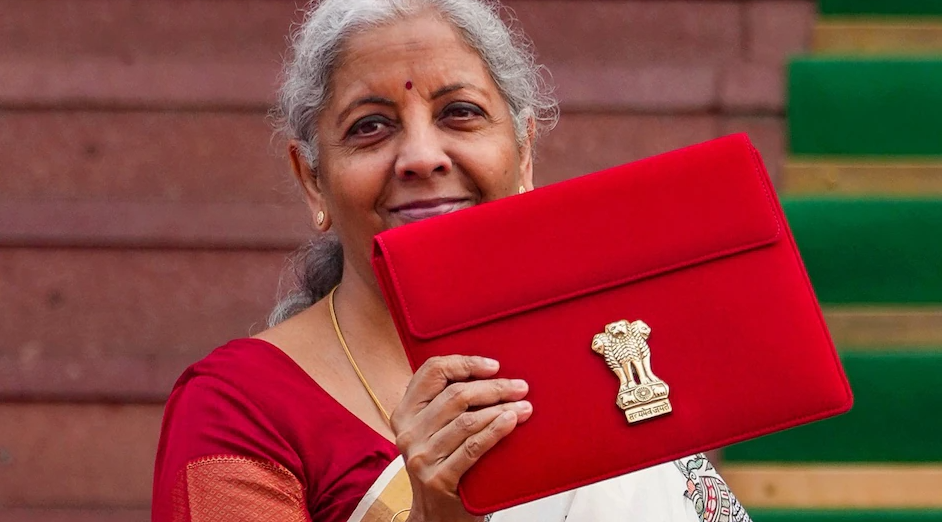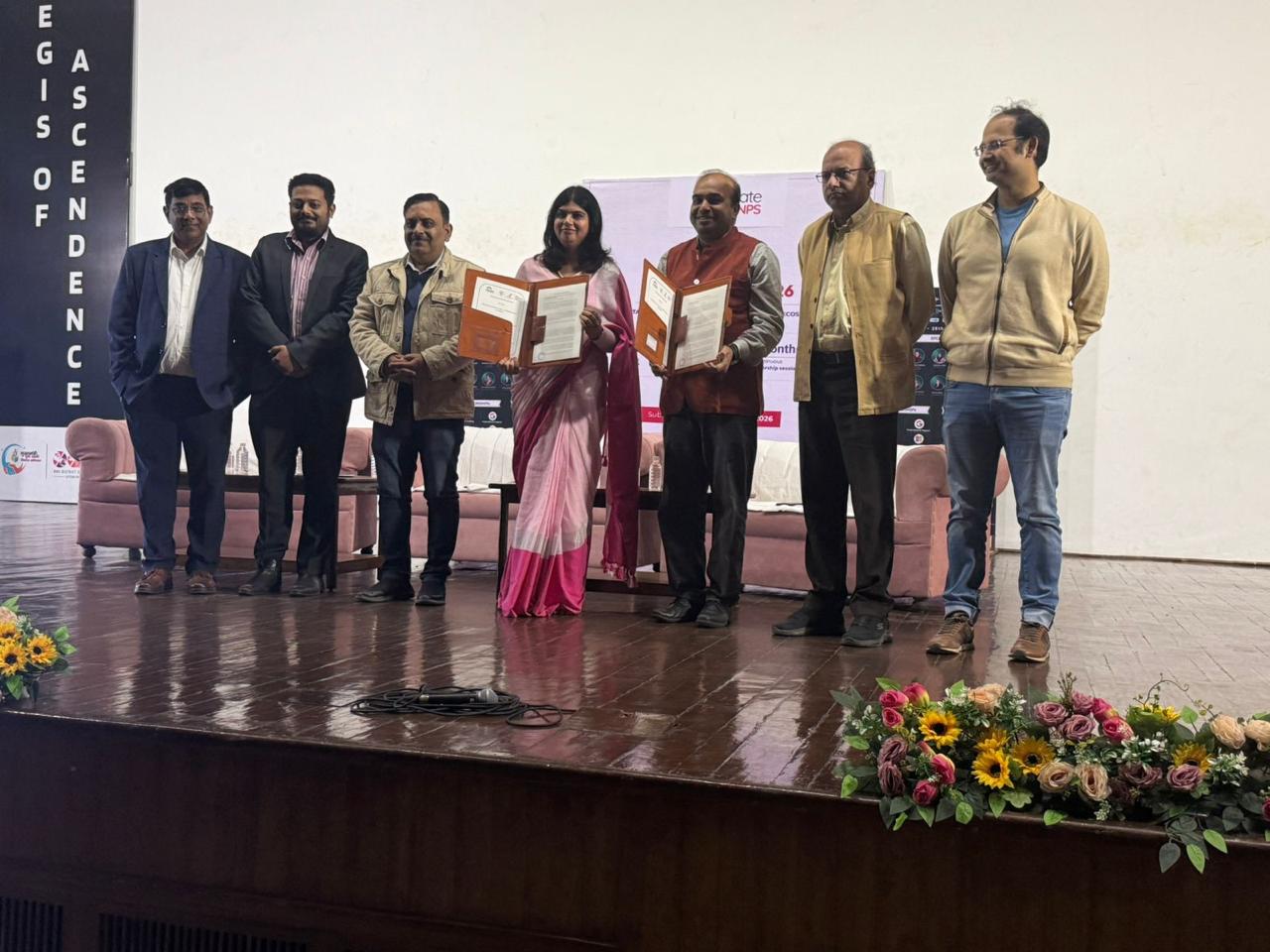
New Delhi: Finance Minister Nirmala Sitharaman presented the Union Budget 2025-26 on February 1, 2025, which included several key announcements. The budget provides significant relief to the middle class by raising the income tax exemption limit to ₹12 lakh, meaning there will be no tax on income up to ₹12 lakh. Additionally, the limit for the Kisan Credit Card (KCC) loan has been increased from ₹3 lakh to ₹5 lakh, offering more financial support to farmers. The formation of the Makhana Board in Bihar and financial assistance for the Western Koshi Canal project were announced to improve irrigation facilities for farmers.
Major steps have also been taken in the fields of education and skill development, with the expansion of 6,500 seats in IITs and medical colleges, and the addition of 10,000 new seats. In the health sector, daycare cancer centers will be established, and custom duties on life-saving medicines have been reduced. Furthermore, the target has been set to increase nuclear energy production to 100 gigawatts by 2047, and a reduction in the cost of electric vehicles has been proposed by offering exemptions on lithium-ion batteries. A ₹1 lakh crore Urban Challenge Fund will be established for urban development, aimed at improving infrastructure in urban areas. Prime Minister Narendra Modi described this budget as “the budget of the people,” stating that it is a budget that will fulfill the dreams of every Indian.
Industry views on the budget:
Gopal Jain, Managing Partner & CO-Founder, Gaja Capital & Co-Chair, Regulatory Affairs Committee, IVCA said – “The amendment to the definition of ‘capital asset’ under Section 2(14) is a landmark reform that brings much-needed tax clarity for investment funds, including Alternative Investment Funds (AIFs). By ensuring that securities held by these funds are classified as capital assets, the government has eliminated ambiguity around their tax treatment, reinforcing investor confidence and reducing potential litigation.
Furthermore, the announcement of a 10,000 Cr FoF with expanded scope and provision for a Deeptech FoF is a significant step toward strengthening domestic pools of capital for cutting-edge innovation. This has been a long-standing industry demand, and we are encouraged to see the government’s commitment to catalyzing next-generation enterprises and startups in critical sectors.
This move aligns India’s regulatory framework with global best practices and provides a stable, predictable tax environment—critical for attracting long-term institutional capital. The uniform treatment of capital gains taxation will enhance the competitiveness of India’s alternate capital industry, encouraging more investments into high-growth sectors.We welcome these reforms, as they strengthen the ease of doing business for fund managers and investors alike, creating a more robust and efficient capital market ecosystem.”
Rajat Tandon, President, IVCA said – “At IVCA, we are grateful to our Finance Minister, respected Secretary, and policymakers for their continued efforts in strengthening India’s investment landscape. The Finance Minister’s decision to explicitly define securities held by investment funds as capital assets is a landmark step for the Indian alternate capital industry. This long-awaited reform brings much-needed tax certainty, minimizing disputes and aligning India’s regulatory framework with global best practices. The clarity in tax treatment will provide a strong boost to investor confidence, paving the way for increased domestic and international capital flows into high-growth sectors.
The government’s continued focus on fostering innovation—through an expanded Fund of Funds and the proposed Deep Tech Fund—is equally commendable. These initiatives will ensure that emerging businesses, particularly in frontier technologies, have access to critical growth capital, further cementing India’s position as a global startup hub.
Additionally, the announcement of the ₹25,000 crore Maritime Development Fund is a significant step in enhancing India’s logistics and trade infrastructure. With up to 49% government participation and the remainder mobilized from the ports and private sector, this fund will boost competition, improve efficiency, and unlock new investment opportunities in the maritime sector.
At IVCA, we remain committed to working alongside policymakers to create an enabling regulatory environment that attracts long-term capital, fuels entrepreneurship, and accelerates India’s economic growth.”
Ashley Menezes, Chairperson IVCA and Partner & COO, ChrysCapital, said “The Union Budget 2025-26 reflects a strong commitment to strengthening India’s alternate capital ecosystem with much-needed clarity on taxation, continued support for startups, and expansion of fund structures that drive economic growth. The amendment to the definition of ‘capital asset’ under Section 2(14) is a significant win for the industry, providing much-needed tax certainty to investment funds and aligning them with global best practices.The government’s decision to set up a new Fund of Funds with a ₹10,000 crore contribution, along with the proposal to explore a DeepTech Fund, is a timely boost for India’s thriving startup ecosystem. These steps, coupled with the extension of incorporation benefits for startups and targeted incentives for IFSC entities, will enhance capital flow, spur innovation, and attract long-term investments. The extension of tax benefits for sovereign and pension funds investing in infrastructure till March 2030 also ensures sustained funding for India’s long-term development. We commend the Finance Minister for these progressive measures that will catalyze capital formation, deepen private investment, and reinforce India’s position as a global investment hub.”
Ratul Puri, Chairman, Hindustan Power said- We applaud the Union Budget’s progressive measures aimed at accelerating India’s energy transition and achieving net-zero emissions by 2070. The focus on creating a ‘Make in India’ ecosystem in clean tech manufacturing including solar PV cells, electrolysers for green hydrogen production, and grid-scale batteries will enhance renewable energy integration and grid stability, while incentives for electricity distribution reforms promise to improve DISCOM efficiency and reduce losses.
The ambitious target of 100GW of nuclear energy by 2047, supported by public-private partnerships, highlights the commitment to diversifying India’s energy mix and accelerating the energy transition. Additionally, mining sector reforms, including the sharing of best practices and the institution of a State Mining Index, will ensure sustainable resource utilization. The three-year pipeline for Public-Private Partnership projects will fast-forward India’s infrastructure development, ensuring long-term sustainability while driving innovation.
The revision of income tax slabs is a progressive step that will encourage higher savings and increased consumer spending, stimulating economic growth. These initiatives mark a significant step towards a cleaner, more resilient, and sustainable future, and we are excited to play a role in this transformation.
Mr. Ritesh Goenka, Managing Director of Damson Technologies said on budget 2025 – “Finance Minister Nirmala Sitharaman’s announcement of the National Manufacturing Mission in the 2025 Union Budget is a commendable step towards strengthening India’s manufacturing sector. By providing policy support and a structured framework, this mission is poised to enhance domestic production and self-reliance, aligning seamlessly with our objectives at Damson Technologies. The emphasis on Micro, Small, and Medium Enterprises (MSMEs) as pivotal growth engines, responsible for 45% of India’s exports, is particularly encouraging. The introduction of customized credit cards for micro-enterprises and the enhancement of classification limits for MSMEs will undoubtedly facilitate greater financial inclusion and operational expansion.
Damson Technologies is a leading OEM and manufacturer of computer peripherals, accessories, and lifestyle products. Our flagship brand, JUST CORSECA, embodies innovation and quality. With a ₹200 crore investment, our state-of-the-art Ahmedabad facility produces high-quality audio systems and smart accessories, reducing import dependence and meeting domestic demand. The government’s focus on clean technology manufacturing and attracting investments across various sectors resonates with our vision of integrating advanced innovations, including AI-powered products and app-based controls, into our offerings. We are optimistic that these budgetary measures will nurture a more robust manufacturing ecosystem, enabling companies like ours to thrive and contribute significantly to India’s economic growth and global competitiveness.”
Mr. Rajeev Gupta, CEO, RSWM Ltd. said- “The Union Budget for FY 2025-26 introduces key reforms to promote domestic production of technical textile products such as agro textiles, geo textiles and medical textiles at competitive prices. The inclusion of two more shuttle-less looms in the list of fully exempted textile machinery is a progressive step toward expanding production capacity in textile manufacturing. The government’s emphasis on Atmanirbharta through increased indigenous textile production aligns well with the proposed revision of the Basic Customs Duty (BCD) rate on knitted fabrics across nine tariff lines—from 10% or 20% to 20% or ₹104 per kg, whichever is higher. The government’s commitment to providing technical and R&D support for cotton farmers under the 5 years mission is a welcome move. This initiative is expected to improve cotton farming efficiency and promote diverse cotton varieties.”
Nishant Sood, Managing Director, Candi Solar said- “The announcement of the National Manufacturing Mission aimed at supporting clean technology, particularly in EV batteries and solar panels, marks a crucial step in strengthening India’s leadership in the renewable energy sector. This visionary initiative will not only promote domestic production but also encourage innovation and improve efficiency, accelerating our transition towards clean energy. We are particularly encouraged by the government’s focus on expanding battery storage, a vital component for the widespread adoption of solar energy. While the current production-linked incentive schemes are a positive development, additional duty-based support for storage technologies will be essential to unlock the full potential of solar power in India. This Budget clearly demonstrates a commitment to a sustainable, self-reliant energy future, and we are thrilled to be a part of this transformative journey.”
The Budget 2025 aims to strike a balance between supporting industries and offering relief to common people. For industries, the government has introduced the National Manufacturing Mission to encourage clean technology, particularly in EV batteries and solar panels, strengthening India’s position in the renewable energy sector. There’s a focus on scaling up battery storage, crucial for solar energy adoption, and further support for production-linked incentive schemes to boost domestic manufacturing. Investments in infrastructure development, including a ₹1 lakh crore Urban Challenge Fund, will enhance urban living standards. Additionally, the establishment of skill centers and a framework for Global Capability Centers in Tier 2 cities will improve talent availability and industry collaboration. The MSME sector also benefits from increased investment and turnover limits, which will encourage growth and job creation.
For common people, the Budget brings significant relief, especially in terms of income tax, with the limit raised to ₹12 lakh, ensuring no tax is levied on incomes up to that threshold. Farmers will benefit from an increase in the Kisan Credit Card (KCC) loan limit from ₹3 lakh to ₹5 lakh, offering enhanced financial support. The health sector sees a boost with the addition of 10,000 new medical college seats and the establishment of daycare cancer centers in district hospitals. The government is also promoting electric vehicles with cuts on lithium-ion battery duties, making them more affordable. Moreover, women and marginalized communities will receive support through financial assistance to help start businesses. Overall, the Budget focuses on infrastructure, healthcare, education, and green technology, fostering a self-reliant and sustainable economic growth model for both industries and the common people.







